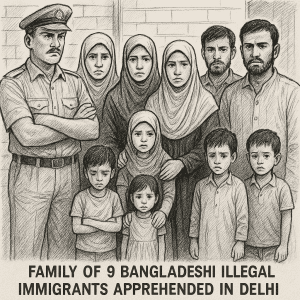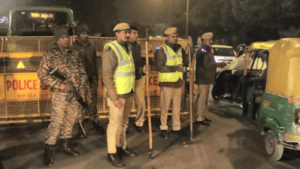New Delhi – In a significant law enforcement operation that highlights ongoing immigration challenges, Delhi Police successfully apprehended a complete family comprising nine members, representing a major case of Illegal Bangladeshi In Delhi residents living without proper documentation. The comprehensive raid in Bharat Nagar, northwest Delhi, resulted in the arrest of individuals ranging from a 45-day-old infant to adult family members, all facing immediate deportation proceedings.
The Discovery and Arrest Operation


The case of Illegal Bangladeshi In Delhi residents came to light following intelligence received by the Foreigners Cell regarding suspicious activities in the Bharat Nagar area. Deputy Commissioner of Police (Northwest) Bhisham Singh revealed that the operation required extensive surveillance and systematic checking of nearly 100 lanes and 50 footpaths before successfully locating the Illegal Bangladeshi In Delhi family.
The meticulous approach adopted by Delhi Police in tracking down this Illegal Bangladeshi In Delhi case demonstrates the complexity of identifying and apprehending unauthorized immigrants who deliberately attempt to blend into urban communities. The Friday raid that led to the discovery of the Illegal Bangladeshi In Delhi family required significant resources and careful planning to ensure comprehensive coverage of the target area.
Also Read: Delhi Rain Today Triggers Massive Waterlogging & Flight Disruptions at IGI Airport
Initial Deception and Subsequent Confession
During the initial phases of questioning, the primary suspect attempted to mislead law enforcement officials by falsely claiming Indian citizenship, highlighting the common tactics employed by Illegal Bangladeshi In Delhi residents to avoid detection. However, sustained interrogation eventually led to a complete confession, revealing the true extent of the Illegal Bangladeshi In Delhi family’s unauthorized presence in the capital.
The breakthrough in this Illegal Bangladeshi In Delhi case came when the apprehended individual finally acknowledged his Bangladeshi nationality under persistent questioning. This confession subsequently led to the identification and arrest of eight additional family members, demonstrating how one Illegal Bangladeshi In Delhi case can uncover larger networks of unauthorized residents.
Family Composition and Demographics

The arrested Illegal Bangladeshi family consists of nine members spanning three generations, illustrating the complex family structures often involved in illegal immigration cases. The family head, Mohammad Saidul Islam, aged 45, along with his wife Nazma Begum, aged 42, represent the senior generation of this Illegal Bangladeshi In Delhi group.
The middle generation of this Illegal Bangladeshi family includes their sons Nazmul Ali (23), Ali (19), and two additional sons aged 17 and 8, plus a daughter aged 6. The youngest generation involves Nazmul’s wife, Azina Begum (20), and her 45-day-old son, making this Illegal Bangladeshi In Delhi case particularly complex due to the presence of a newborn infant.
Border Crossing and Entry Route
Investigation revealed that this Illegal Bangladeshi family had entered India through the Cooch Behar border in West Bengal several months prior to their arrest. The Cooch Behar crossing point represents a significant vulnerability in border security, frequently exploited by Illegal Bangladeshi In Delhi migrants seeking unauthorized entry into Indian territory.
The choice of the Cooch Behar border by this Illegal Bangladeshi In Delhi family reflects common patterns observed in illegal immigration cases, where specific border crossings are favored due to perceived security gaps or established smuggling networks. The successful crossing by this Illegal Bangladeshi In Delhi group highlights ongoing challenges in comprehensive border monitoring and control.
Journey Through Haryana Before Delhi Arrival
Before becoming an Illegal Bangladeshi In Delhi case, the family initially settled in Mewat, Haryana, where they secured employment at a brick manufacturing unit. This pattern of seeking work in labor-intensive industries is typical among Illegal Bangladeshi In Delhi migrants who require immediate income generation while avoiding formal employment verification processes.
The family’s decision to leave Haryana and become an Illegal Bangladeshi In Delhi case was driven by fear of detection by Haryana Police, indicating increased vigilance by law enforcement agencies across multiple states. This fear-based migration that led to the Illegal Bangladeshi In Delhi situation demonstrates how unauthorized immigrants constantly move to avoid apprehension.
Survival Strategies in Delhi
Upon arrival in Delhi, this Illegal Bangladeshi In Delhi family adopted sophisticated survival strategies, frequently changing their sleeping locations on various footpaths while actively seeking permanent rental accommodation. The constant movement employed by this Illegal Bangladeshi In Delhi group reflects common tactics used to avoid detection by authorities while attempting to establish a stable living situation.
The process of securing rental accommodation represents a significant challenge for any Illegal Bangladeshi In Delhi family, as landlords increasingly demand proper documentation before agreeing to tenancy arrangements. The ongoing search for housing by this Illegal Bangladeshi In Delhi group ultimately contributed to their exposure and subsequent arrest.
Technology Usage and Communication Methods
Law enforcement officials recovered a smartphone containing the banned IMO application from the Illegal Bangladeshi In Delhi family, revealing how unauthorized immigrants maintain contact with relatives in their home country. The use of banned applications by this Illegal Bangladeshi In Delhi group highlights the technological sophistication often employed to circumvent official communication monitoring.
The discovery of the IMO application on devices belonging to the Illegal Bangladeshi In Delhi family provides insight into communication networks that support illegal immigration operations. Such technology usage by Illegal Bangladeshi In Delhi residents enables coordination with family members and potential accomplices across international borders.
Law Enforcement Response and Investigation Methodology


The successful identification and arrest of this Illegal Bangladeshi In Delhi family required coordinated efforts between multiple law enforcement units, including the specialized Foreigners Cell. The systematic approach employed in this Illegal Bangladeshi In Delhi case involved comprehensive area searches and methodical interrogation techniques to uncover the full extent of the illegal presence.
The investigation methodology that led to exposing this Illegal Bangladeshi In Delhi case demonstrates the importance of intelligence-based operations in addressing unauthorized immigration. The success in this Illegal Bangladeshi In Delhi situation provides a template for future operations targeting similar illegal immigration networks.
Deportation Proceedings and Legal Framework
Following their arrest, the entire Illegal Bangladeshi family has been handed over to the Foreigners Regional Registration Office (FRRO) for initiation of deportation proceedings. The legal process governing this Illegal Bangladeshi family case involves multiple administrative steps designed to ensure proper documentation and coordination with Bangladeshi authorities.
The deportation process for this Illegal Bangladeshi family will require significant coordination between Indian and Bangladeshi immigration authorities. The complexity of deporting an Illegal Bangladeshi family with a newborn infant adds additional humanitarian considerations to the standard deportation procedures.
Broader Immigration Control Implications
This Illegal Bangladeshi family case highlights broader challenges facing Indian immigration control systems, particularly in urban areas where unauthorized immigrants can more easily blend into diverse populations. The successful detection of this Illegal Bangladeshi family demonstrates both the challenges and potential solutions in addressing illegal immigration.
The arrest of this Illegal Bangladeshi family may provide valuable intelligence for identifying other unauthorized immigrant networks operating in Delhi and surrounding areas. The information gathered from this Illegal Bangladeshi family case could lead to additional arrests and deportations in future operations.
Closing Remarks: Ongoing Vigilance in Immigration Control
The successful arrest and processing of this Illegal Bangladeshi family represents a significant achievement in immigration law enforcement, demonstrating the effectiveness of coordinated police operations in identifying and apprehending unauthorized immigrants. The case underscores the continuing need for vigilant border control and urban surveillance to address the complex challenges posed by illegal immigration in major Indian cities.

